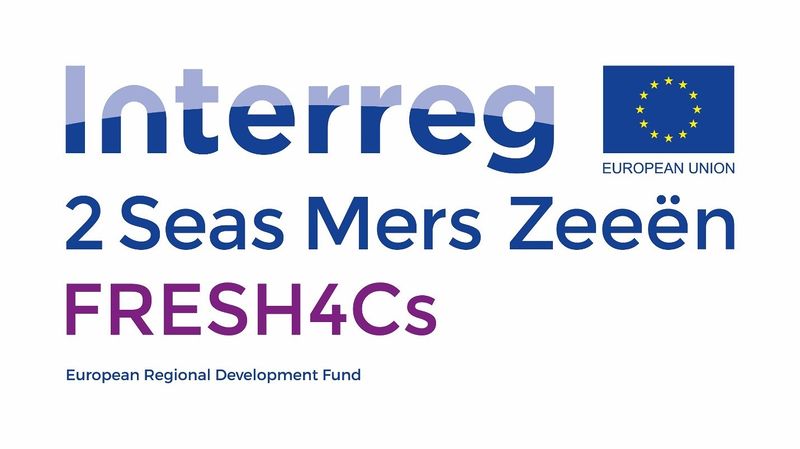PR 00309: verschil tussen versies
(Nieuwe pagina aangemaakt met ' {{Project config}} {{Project |Name=FRESH4Cs |Supercontext=Water Technology |Start date=2019/02/15 |End date=2022/09/30 |Summary=The FRESH4Cs project focuses on the...') |
Geen bewerkingssamenvatting |
||
| Regel 1: | Regel 1: | ||
[[Bestand:FRESH4Cs Logo.jpg|gecentreerd|kaderloos|800x800px]] | |||
The Water Technology Research Group is working on an Interreg 2 Seas Project called FRESH4Cs; an acronym for alternative fresh water resources for saline coastal areas. This project started in February 2019 and will run for four years until September 2022. The project was granted by the {{Cite|resource=Resource Hyperlink 00735|name=Interreg 2 Seas Programme|dialog=process-linkwebsite-dialog}}, the aim of which is to support and develop a {{Cite|resource=Resource Hyperlink 00736|name=2 Seas area|dialog=process-linkwebsite-dialog}} where the natural resources are protected; the FRESH4Cs project in this case focuses on the resource of fresh water. | |||
Traditional water resources are under pressure in the 2seas region, with this problem being even more prominent in lowland coastal areas due to salinization of surface waters. These same coastal areas drain vast amounts of water towards the sea at moments of water surplus, for example in the winter but can also experience a shortage in fresh water supply or drought in summer. Fresh water supply in these areas can be viewed as a seasonal issue, therefore, the main objective of the FRESH4Cs project is to provide year-long sustainable fresh water supply for the different water users in coastal lowlands, as an alternative to using overexploited deeper aquifers or long distance water supply through pipelines. | |||
Five pilot locations will be set up in the project in the Netherlands, Belgium and the United Kingdom in order to install and test alternative methods of fresh water supply. The different methods include, managed aquifer recharge, storage and redistribution. These pilot locations will benefit local actors in the water field: water managers (governmental or private), water utilities and water users such as farmers, tourism and drinking water production. The partners working together on this project include; VITO Vlakwa, IWVA and VLM from Belgium, Suffolk County Council, Felixstowe HydroCycle Ltd and University of East Anglia in the UK and Dow Benelux B.V., Lamb Weston Meijer and HZ University of Applied Sciences in the Netherlands. | |||
The Water Technology Research Group will be responsible for a technology assessment as well as the setting up of a monitoring plan for each pilot location; this will be performed by Hans Cappon, Emma McAteer and Bart Letterie. The information gathered during the testing and monitoring phase will be analysed and compared for best practice conclusions, the best practices will be used to feed into the development of a roadmap for widespread implementation which will be executed by Ageeth van Maldegem and Stef Bleyenberg. | |||
''Project ‘FRESH4Cs’ is financed by the Interreg 2 Seas, a transborder collaborative programme which receives financial aid from the European Regional Development Fund. For more information, please visit:'' {{Cite|resource=Resource Hyperlink 00737|name=www.fresh4cs.eu|dialog=process-linkwebsite-dialog}} | |||
{{Project config}} | {{Project config}} | ||
Versie van 21 apr 2020 12:33
The Water Technology Research Group is working on an Interreg 2 Seas Project called FRESH4Cs; an acronym for alternative fresh water resources for saline coastal areas. This project started in February 2019 and will run for four years until September 2022. The project was granted by the Interreg 2 Seas Programme, the aim of which is to support and develop a 2 Seas area where the natural resources are protected; the FRESH4Cs project in this case focuses on the resource of fresh water.
Traditional water resources are under pressure in the 2seas region, with this problem being even more prominent in lowland coastal areas due to salinization of surface waters. These same coastal areas drain vast amounts of water towards the sea at moments of water surplus, for example in the winter but can also experience a shortage in fresh water supply or drought in summer. Fresh water supply in these areas can be viewed as a seasonal issue, therefore, the main objective of the FRESH4Cs project is to provide year-long sustainable fresh water supply for the different water users in coastal lowlands, as an alternative to using overexploited deeper aquifers or long distance water supply through pipelines.
Five pilot locations will be set up in the project in the Netherlands, Belgium and the United Kingdom in order to install and test alternative methods of fresh water supply. The different methods include, managed aquifer recharge, storage and redistribution. These pilot locations will benefit local actors in the water field: water managers (governmental or private), water utilities and water users such as farmers, tourism and drinking water production. The partners working together on this project include; VITO Vlakwa, IWVA and VLM from Belgium, Suffolk County Council, Felixstowe HydroCycle Ltd and University of East Anglia in the UK and Dow Benelux B.V., Lamb Weston Meijer and HZ University of Applied Sciences in the Netherlands.
The Water Technology Research Group will be responsible for a technology assessment as well as the setting up of a monitoring plan for each pilot location; this will be performed by Hans Cappon, Emma McAteer and Bart Letterie. The information gathered during the testing and monitoring phase will be analysed and compared for best practice conclusions, the best practices will be used to feed into the development of a roadmap for widespread implementation which will be executed by Ageeth van Maldegem and Stef Bleyenberg.
Project ‘FRESH4Cs’ is financed by the Interreg 2 Seas, a transborder collaborative programme which receives financial aid from the European Regional Development Fund. For more information, please visit: www.fresh4cs.eu

